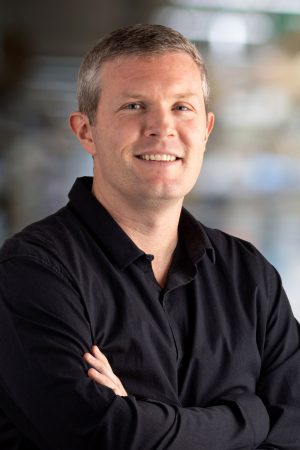
November 11, 2020
LA JOLLA—The Salk Institute has appointed molecular biologist Jesse Dixon to the rank of assistant professor for his significant work in uncovering how the human genome, the DNA blueprint for life, is organized in three-dimensional space inside of cells. The appointment was based on recommendations by Salk faculty, and approved by Salk President Rusty Gage and the Institute’s Board of Trustees.
“We are elated that Jesse will join Salk’s faculty as an assistant professor,” says Gage. “His dedication to science and mentorship have been evident during his time here as a Helmsley-Salk Fellow, and we look forward to seeing him continue to make new discoveries about how irregular genome folding can lead to diseases such as cancer.”

Click here for a high-resolution image.
Credit: Salk Institute
Dixon came to the Institute in 2015 as a Helmsley-Salk Fellow after completing his MD and PhD at the University of California San Diego. The fellowship program is designed to bring scientists from broad disciplines to Salk to trigger innovation and perpetuate the collaborative spirit of the Institute. Fellows have expertise in a wide range of innovative technologies, and their work involves novel, original research that may not obtain support through traditional channels.
“Jesse is a brilliant early-career scientist with expertise in not only molecular and cell biology, but also in technology innovations that will aid other researchers studying genome organization,” says Martin Hetzer, Salk’s vice president and chief science officer. “Jesse’s appointment is also a testament to the success of supporting early-career scientists who push the boundaries of scientific research.”
The organization of the genome inside a cell plays a critical role in the cellular machinery’s access to DNA, yet understanding how genomes are folded and the consequences of folding errors are two extraordinary challenges for scientists. Dixon uses computational techniques and laboratory science to explore how abnormal genome folding leads to errors in critical stretches of DNA that can cause many conditions, including cancer. He has made numerous discoveries, including revealing a fundamental feature of how genomes are organized, called topologically associating domains (TADs), as well as identifying some of the basic consequences of gene mutations on genome folding that lead to cancer.
His team is also developing new methods to study gene organization and gene function in single cells. By profiling each individual cell, the scientists gain high-resolution information about the different genes in each cellular system and insights into the molecular mutations that lead to disease.
Dixon is the recipient of multiple awards, including the NIH Early Independence Award (DP5), the UC San Diego Chancellor’s Dissertation Medal for Biological Studies, the UC San Diego Department of Biomedical Science Outstanding Dissertation Award and the California Institute for Regenerative Medicine Pre-Doctoral Fellowship.
Office of Communications
Tel: (858) 453-4100
press@salk.edu
Unlocking the secrets of life itself is the driving force behind the Salk Institute. Our team of world-class, award-winning scientists pushes the boundaries of knowledge in areas such as neuroscience, cancer research, aging, immunobiology, plant biology, computational biology and more. Founded by Jonas Salk, developer of the first safe and effective polio vaccine, the Institute is an independent, nonprofit research organization and architectural landmark: small by choice, intimate by nature, and fearless in the face of any challenge.